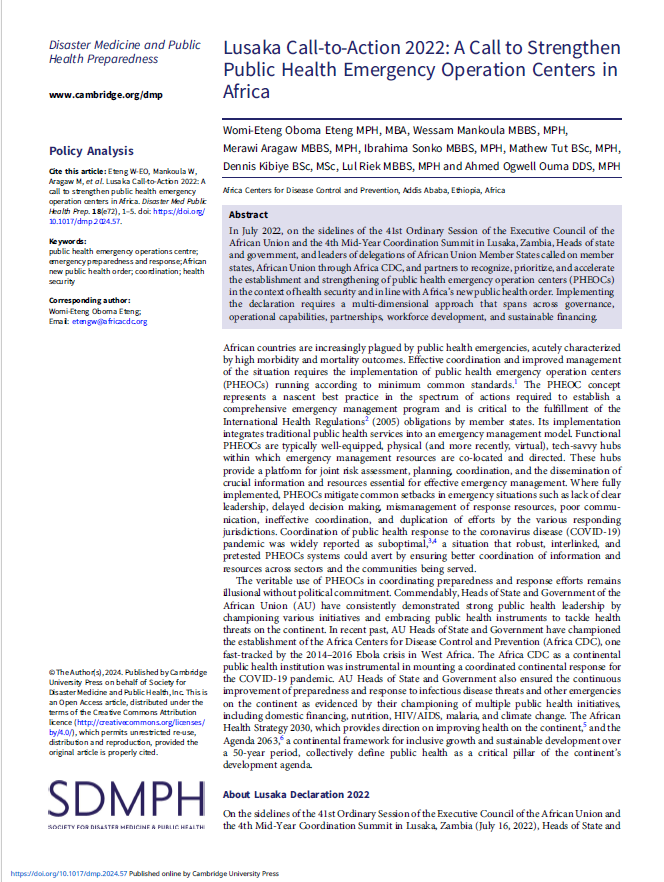Published online by Cambridge University Press: 16 April 2024
Womi-Eteng Oboma Eteng, Wessam Mankoula, Merawi Aragaw, Ibrahima Sonko, Mathew Tut, Dennis Kibiye, Lul Riek and Ahmed Ogwell Ouma
In July 2022, on the sidelines of the 41st Ordinary Session of the Executive Council of the African Union and the 4th Mid-Year Coordination Summit in Lusaka, Zambia, Heads of state and government, and leaders of delegations of African Union Member States called on member states, African Union through Africa CDC, and partners to recognize, prioritize, and accelerate the establishment and strengthening of public health emergency operation centers (PHEOCs) in the context of health security and in line with Africa’s new public health order. Implementing the declaration requires a multi-dimensional approach that spans across governance, operational capabilities, partnerships, workforce development, and sustainable financing.
African countries are increasingly plagued by public health emergencies, acutely characterized by high morbidity and mortality outcomes. Effective coordination and improved management of the situation requires the implementation of public health emergency operation centers (PHEOCs) running according to minimum common standards. 1 The PHEOC concept represents a nascent best practice in the spectrum of actions required to establish a comprehensive emergency management program and is critical to the fulfillment of the International Health Regulations 2 (2005) obligations by member states. Its implementation integrates traditional public health services into an emergency management model. Functional PHEOCs are typically well-equipped, physical (and more recently, virtual), tech-savvy hubs within which emergency management resources are co-located and directed. These hubs provide a platform for joint risk assessment, planning, coordination, and the dissemination of crucial information and resources essential for effective emergency management. Where fully implemented, PHEOCs mitigate common setbacks in emergency situations such as lack of clear leadership, delayed decision making, mismanagement of response resources, poor communication, ineffective coordination, and duplication of efforts by the various responding jurisdictions. Coordination of public health response to the coronavirus disease (COVID-19) pandemic was widely reported as suboptimal, Reference Lanyero, Edea and Musa3,Reference Kapucu and Hu4 a situation that robust, interlinked, and pretested PHEOCs systems could avert by ensuring better coordination of information and resources across sectors and the communities being served.
The veritable use of PHEOCs in coordinating preparedness and response efforts remains illusional without political commitment. Commendably, Heads of State and Government of the African Union (AU) have consistently demonstrated strong public health leadership by championing various initiatives and embracing public health instruments to tackle health threats on the continent. In recent past, AU Heads of State and Government have championed the establishment of the Africa Centers for Disease Control and Prevention (Africa CDC), one fast-tracked by the 2014–2016 Ebola crisis in West Africa. The Africa CDC as a continental public health institution was instrumental in mounting a coordinated continental response for the COVID-19 pandemic. AU Heads of State and Government also ensured the continuous improvement of preparedness and response to infectious disease threats and other emergencies on the continent as evidenced by their championing of multiple public health initiatives, including domestic financing, nutrition, HIV/AIDS, malaria, and climate change. The African Health Strategy 2030, which provides direction on improving health on the continent, 5 and the Agenda 2063, 6 a continental framework for inclusive growth and sustainable development over a 50-year period, collectively define public health as a critical pillar of the continent’s development agenda.
